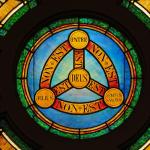In the last post, I argued that the true meaning of Christmas is often obscured by articles, podcasts and essays that abound at this time of year. I claimed that many such commentaries never get around to dealing with the actual claim of Christmas, namely, the incarnation of God. In short, most commentaries about Christmas fail to address the central reason for commemorating the holiday. That reason is a fundamentally theological reason. However, a second facet of the theological claim behind Christmas is that this particular theological claim is also a historical claim. Therefore, the Christmas claim entails two central propositions: a) the biblical God exists and b) this God actually entered into our own space-time reality, at a particular moment on that timeline and a concrete location in that space.
Thus, while Christmas without a “Christ event” is meaningless, so is a Christ event that is not also a particular “Christ moment” in history. The ontological occurrence of the infinite God assuming finite human form (see Phil 2:5-11) is the most significant event in human history because it was an actual event in history. It was not a literary fiction concocted by some imaginative, and rather insane, 1st-century Jews. Nor was it merely a spiritual allegory devised by a group of hellenized mystics. Of course, to show this we must provide evidence for, minimally, two particular temporal events: the birth of Jesus and His Resurrection. The reasons for pointing to these two events will become obvious as the evidence is presented. Put succinctly, however, there must have been an actual Jesus of history, an actual birth, and this same Jesus of history must have been raised bodily from the dead, an actual Resurrection.
The Birth of Jesus, the Christ
The first iconoclastic interpretations of the Jesus of history begin to emerge in the 17th century, mainly among French and German biblical historians. Some of these rationalist interpreters of the Bible went so far as to claim that not only was Jesus merely a man, around which many later, religious legends accrued, but that there was no historical figure, Jesus of Nazareth, whatsoever. According to these scholars, there were only legends. There was no historical referent at all that the legends pointed to.
Given the very existence of the Christian religion, this “Jesus myth” claim seemed radical. How, after all, could an entire religion emerge around a single figure, yet that single figure be not only an embellished figure, but a non-existent one? This would be especially strange given that the purported figure is reported as interacting with historical persons that no one doubts existed, in historical places that everyone knows about, and in a historical context which matches all other historical records of that time period.
The plausibility of this initial claim therefore seemed quite low. However, because Jesus, as portrayed in the Bible, appears to embody so many astounding and complex features, not least of all his miraculous powers and bodily resurrection from the dead, a few 18th and 19th century rationalists thought a case could be made that he was indeed a pure fiction. Not to mention the fact that the textual evidence for any ancient figure is inevitably sparse enough to leave the door sufficiently ajar for even the wildest speculations. At the same time, this particular speculative project has been carried out in spite of the fact there is more documentary evidence for Jesus than for other ancient figures, like Pontius Pilate. Yet no historian rejects the existence of the Roman Procurator/Prefect (at least no longer), who is mainly known to us on account of his being Jesus’ official executioner.
The “Jesus/Christ Myth” theory has, therefore, gained very little traction over the years. From early proponents like de Volney and Dupuis to Carrier and Price today, the Christ myth view has always maintained the status of “fringe.” In fact, the view is so fringey, that historians like Philip Jenkins can say with near epistemic certitude the following about its status as scholarship:
What you can’t do, though, without venturing into the far swamps of extreme crankery, is to argue that Jesus never existed. The “Christ-Myth Hypothesis” is not scholarship, and is not taken seriously in respectable academic debate. The grounds advanced for the “hypothesis” are worthless. The authors proposing such opinions might be competent, decent, honest individuals, but the views they present are demonstrably wrong.
Jenkins, “The Myth of the Mythical Jesus”
Of course, one should not fall prey to two fallacies: argumentum ad populum (the appeal to the majority) or the argumentum ab auctoritate (the appeal to authority). However, and this is a big ‘however,’ what one has in the case of Jesus mythicism is not only an infraction against the consensus, but an infraction against the consensus of the experts over an extended period of time, and with little to no discovery of any new evidence since the original position was formulated. Thus, Jesus mythicism is rightly considered fringe in that while a consensus of experts in the relevant field do not solidify the historicity of Jesus beyond all doubt, the conjunction of consensus, relevant expertise, and duration of the traditional view acts as near overwhelming evidence for the fact of Jesus’ existence. Indeed so much so that, as Jenkins points out, it strains respectability to consider the alternative as good scholarship.
Nevertheless, I would encourage readers to do their own research. One of the first papers I wrote in graduate school, actually it was the first paper I wrote in graduate school, was on the historicity of Jesus. As far as I can tell, the best recent defenses of Jesus mythicism are Earl Doherty’s Jesus Neither God Nor Man, and G.A. Wells’ The Historical Evidence for Jesus. The best counters to Jesus mythicism are simply too numerous to mention here. However, this article by Lawrence Mykytiuk captures both the main substance of the pro-historicity evidence, as well as the numerous resources that develop arguments from that evidence. These include the writings of scholars like Bart Ehrman, Gerd Theissen and Annette Merz, Larry Hurtado, Craig Evans and Robert van Voorst. Given the range of religious commitments and worldview of the pro-historicity authors, this acts as yet another piece of evidence for the validity of Jesus’ birth (since to be born is to exist in the historical sense). Mythicist authors are exclusively atheist or agnostic in their worldview. Pro-historicity authors range from atheist to agnostic to liberal Christian to conservative Evangelicals, Catholics and Orthodox.
In conclusion, there is overwhelming evidence and an abundance of arguments to affirm what is the far more parsimonious of these two competing claims, namely, that Jesus was born. And so, even if Jesus was not God, but merely a wise man, one could still celebrate some version of Christmas. Although I would not know why one would do so.
The Resurrection of Jesus, the Christ
The second claim to defend is that of Jesus’ literal, historical resurrection from the dead. The reason why the Resurrection matters most to the question of Christmas, is because we most likely would not celebrate the incarnation of God, if Jesus had not been raised from the dead. If Jesus of Nazareth had been executed by the Romans in or around April of 33 AD, but stayed dead, it is highly improbable anyone would have ever begun to worship Him as God. And if no one had ever begun to worship Jesus as God, it is equally improbable we would have any writing about him, either in the form of Gospel narratives, or occasional epistles, declaring Him to be God.
A dead messiah is hardly a messiah worth worshipping as the eternal God of the universe. Indeed this would have probably been the case even if Jesus had worked certain wonders during his lifetime, given especially compelling ethical advice, made certain claims about his identity, and been an all-around nice guy (which, in some sense, he wasn’t even that). Of all the great moral teachers of antiquity, from Plato to Confucius to Siddhartha, no religion ever emerged worshipping them as God. One Gifford lecturer explained the reason for this:
And here we may see why the belief [of incarnation] is so offensive to the Jew and so unintelligible to the Hindu. The Jew cannot conceive how his God could become incarnate in any man; the Hindu cannot conceive how any one man should be the sole and exclusive incarnation of God. He thinks of deity as incarnate in every man and in all forms of life; in so thinking he makes incarnation in the Christian sense impossible, for by deifying everything he undeifies all.
A.M. Fairbairn, The Philosophy of the Christian Religion
Thus, the commemoration of the incarnation hinges on the truth of Jesus’ identity, and that hinges on whether or not He rose from the dead. St. Paul, writing very early in the aftermath of the passion of Christ, put it this way:
12 Now if Christ is proclaimed as raised from the dead, how can some of you say that there is no resurrection of the dead? 13 But if there is no resurrection of the dead, then not even Christ has been raised. 14 And if Christ has not been raised, then our preaching is in vain and your faith is in vain. 15 We are even found to be misrepresenting God, because we testified about God that he raised Christ, whom he did not raise if it is true that the dead are not raised. 16 For if the dead are not raised, not even Christ has been raised. 17 And if Christ has not been raised, your faith is futile and you are still in your sins. 18 Then those also who have fallen asleep in Christ have perished. 19 If in Christ we have hope[b] in this life only, we are of all people most to be pitied.
1 Cor 15:12-19
Although it seems incredible that Christianity would exist independent of an actual, bodily resurrection of its founder, that has been the main line of skepticism since the rise of modernism in the 17th century. The obvious tension being between an atheistic form of naturalism and the claim of supernatural-like events, i.e., dead bodies rising from the grave. Responses to this skepticism have abounded, and I cannot reiterate those responses in detail. However, there are two types of skeptical historical approaches worth mentioning here. There are those historians who, given their atheistic materialism, have sought to disprove the Resurrection by offering alternative, naturalistic hypotheses for the rise of Christianity (e.g., stolen body, conspiracy theory, wrong tomb, hallucination, etc.). Other historians, alternatively, have tried to claim a middle ground of agnosticism with regard to the Resurrection.
These latter historians suggest that historical investigation alone cannot proclaim one way or the other whether something like a resurrection could occur. They maintain that this is not a “historical” question, but a purely theological one. However, this position begs the question in that it presumes history must be done within the constraints of metaphysical naturalism. But that itself is not a conclusion of history, it is an arbitrary, philosophical presupposition put upon historical investigation. There is no historical reason to think that there are no, or cannot be, causal interactions in space and time that are not exclusively reducible to natural processes. That is a purely metaphysical assumption made by historians who just happen to live in a broadly secular environment. And so, the Resurrection of Jesus most certainly can be investigated as a historical event, regardless of what these methodological naturalists say.
As to the actual arguments for a historical resurrection of Jesus the Christ, I recommend three books for review:
- The Son Rises by William Lane Craig
- Risen Indeed: A Historical Investigation Into the Resurrection of Jesus by Gary Habermas
- The Resurrection of the Son of God by N.T. Wright
The Historicity of Christmas
I have not defended the particular accounts of Jesus’ birth as found in the Gospels of Matthew or Luke, although one could do that. Nor did I go into particular detail on the Resurrection, which is too much to handle in a blog post. Instead I have argued that if Jesus was born at all, and if Jesus really was raised from the dead, and if these are both actual facts of history, then the conjunction of these two historical facts tell us exactly what Christmas is and, in turn, give us excellent reasons to celebrate it.
In sum, Christmas is the historical moment of God becoming man, which is a theological event. Christmas is the moment of the birth of the Godman. We know this to be true because we have good evidence that Jesus was born and that Jesus was God. If it is true, then this is what we should celebrate every year, regardless of whether it happened on December 25th, in 6 BC, or at some other particular time in or around that moment.
On a sidetone, it should be pointed out for the sake of dispelling bad historical claims that the idea that December 25th as the day of Jesus’ birthday was derived from some pagan holiday, is itself bunk history. We may not know exactly when Jesus was born, but the idea that the December 25th date posited by early Christians was a rip-off of some pagan holiday of the sun is total nonsense. Instead, as William Tighe points out here, making Jesus’ birthday on the 25th of December was the result of a very Jewish way of calculating birthdates.















